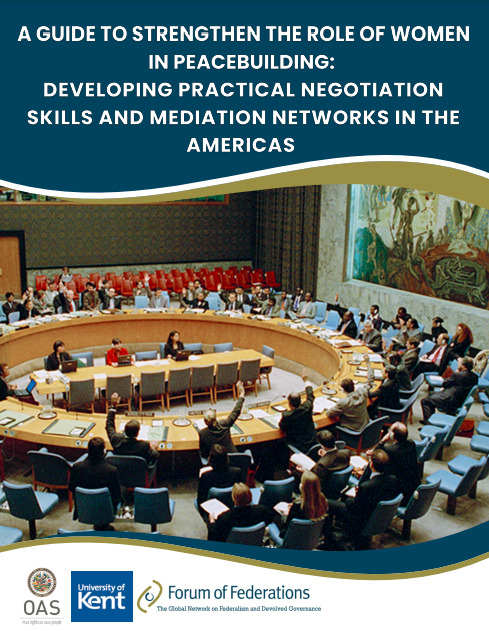Library

Language:
EnglishTopic:
International Conference, Mediation, PeacebuildingCollection:
Conference ReportsAuthors:
Publication Year:
2022
Other Details:
On October 31st, 2000, the United Nations Security Council (UNSC) adopted Resolution 1325 on Women, Peace, and Security to address policy gaps concerning women’s roles in peacebuilding processes and the impact that conflict and violent situations have on women specifically.
UNSCR 1325 highlights the vital contributions of women in conflict prevention and peacebuilding and explores the measures that must be taken to achieve women’s full participation and involvement in peace processes. It emphasizes women’s vital perspectives when analyzing conflict and strategies focused on achieving sustainable peace processes.
Historically, women, and especially women from minority groups such as indigenous populations, Afro-descendants, refugees, displaced persons, LGBTQ+ and people with disabilities are the most affected by conflict and violence. Women and other minority groups in the Americas are no exception to this trend.
Women do ground-breaking work for justice, peace, and security at local, subnational, national and international level, but traditionally have been omitted or actively excluded in formal peace processes. They continue to be marginalized from preventative peacebuilding and conflict resolution efforts in conflict zones all around the world, despite mounting evidence that inclusion of women’s meaningful participation in peacebuilding processes improves the prospects of peace agreements.
Negotiating peace agreements and successfully managing crises to prevent them from escalating into violence is not an easy task and requires a range of skills and preparation. The annual Café Diplomático HighLevel Training in Mediation and Negotiation (Café Diplomatico) – implemented jointly by the OAS Department for the Promotion of Peace and for the Coordination with the Subnational Governments, the Forum of Federations, and the University of Kent – is a unique training experience designed to provide capacity building to the OAS member States in the field of conflict management. An innovative training course combining cutting-edge negotiation and mediation theory, thematic subject matter expertise, and interactive simulations, Café Diplomatico aims to better prepare relevant actors for future participation in managing conflict, peace negotiations, and peacebuilding in the Americas.
Recognizing the invaluable role that women play in peacebuilding and conflict management and the importance of including women at all decision-making levels within the global and regional peace and security agendas – aligning with UN resolution 1325 – the 2022 Café Diplomático workshop focused on Women in Peace Mediations: A Gender Perspective.
This guide compiles the insights and knowledge shared by the expert practitioners, as well as that which emerged from the exchanges between the training facilitators and workshop participants, as a regional contribution to addressing gender challenges and advancing the inclusion of women at all levels of peacebuilding processes in the Americas.

